‘One Day at a Time’
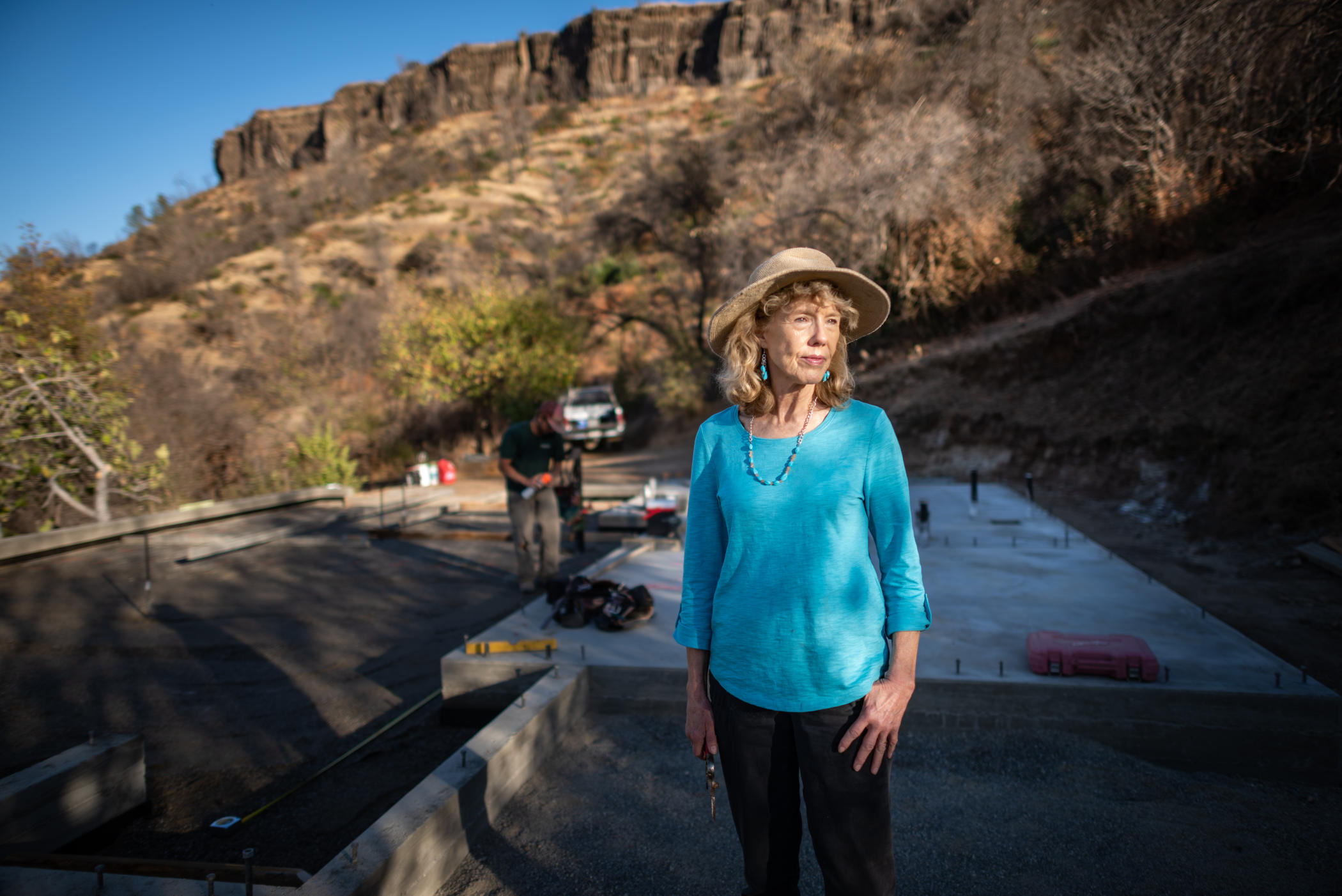
Cindy Wolff surveys the new foundation being laid for her new home along Honey Run Road on Friday, November 6, 2020 in Chico, Calif. Despite being evacuated for fires eight times in 36 years, Wolff did not believe her Butte Creek Canyon home would burn in the Camp Fire when she left the morning of November 8, 2018. Wolff has chosen to rebuild adjacent to the former burned house which currently sits discarded. (Jason Halley/University Photographer/CSU, Chico)
Campus Camp Fire Survivors Share Their Recovery Stories at Two-Year Anniversary
After losing their homes and communities in the deadliest and most devastating fire in California history in 2018, tens of thousands of individuals began to recover from a disaster for which there is no guidebook.
Among those Camp Fire survivors were at least 310 students, faculty, and staff at Chico State who lost homes. Each journey is different, but these survivors share a common reality: they are all searching for normalcy in their own ways.
Six months after the fire, five Wildcats Rise Fire Recovery Fund grant recipients shared stories of what their journeys had been like since November 8, 2018. They provided an update at the one-year anniversary in 2019, and now, approaching the two-year anniversary, share their ongoing challenges and moments of optimism.
CINDY WOLFF
Professor Emerita, Nutrition and Food Science
Retired Director, Center for Healthy Communities
36-year Butte Creek Canyon Resident
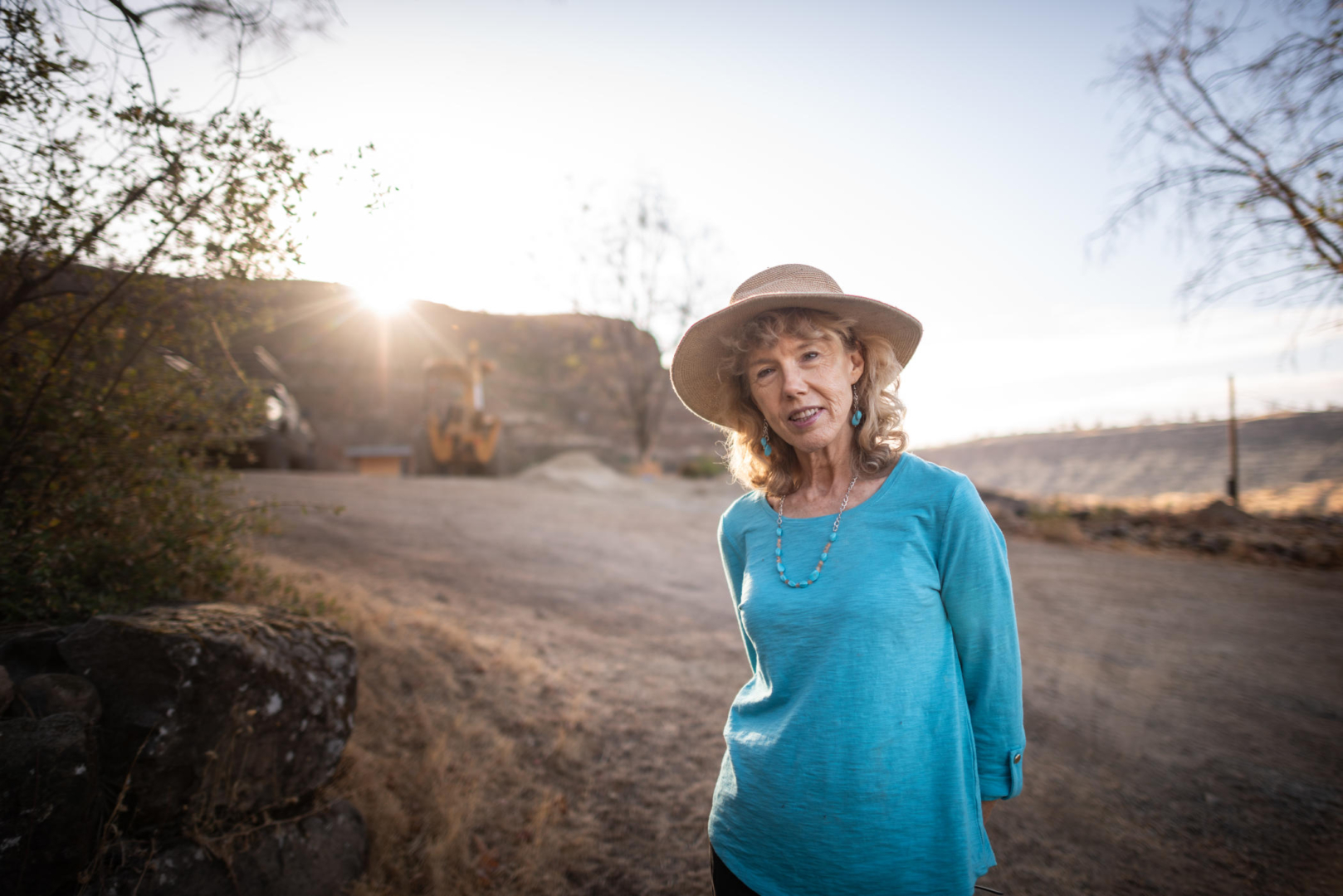
Cindy Wolff was riding her bike through Bidwell Park this July when she smelled smoke. Her breath quickened, her heart raced, and even as the scent faded, she felt tears rolling down her face.
She had been suddenly, unexpectedly transported back two autumns earlier, to the canyon she had called home for 36 years. Her memories ripped her away from the children splashing in the creek nearby and the park’s bright green canopy of trees and returned her to the day flames destroyed so much that she held dear.
Moments such as those remind Wolff she is still dealing with the trauma of the Camp Fire. Returning home from the park, she penned a poem about the experience called “I Wasn’t Thinking.” Poetry has been an important part of her recovery, the challenges of which have been exacerbated by COVID-19.
After retiring from Chico State in August 2019, Wolff and her husband moved into a home they bought in central Chico, their fifth residence since fleeing the fire on November 8, 2018. With their housing situation finally stable, she began to create a sense of normalcy by hosting gatherings with loved ones but then had to put them on hold.
“The separations mandated by the pandemic added to the separations instigated by the Camp Fire,” she said. “The impact has been to slow both our recovery of routines as well as our recovery from the trauma of fire. The lack of ability to gather as one group with our family members as well as with our Camp Fire friends and share stories and recovery steps diminishes an important contribution to our collective recovery.”
Six months after the fire, Wolff was adamant that she would not rebuild. But by the one-year anniversary, the brightness of the stars, their lovingly tended fruit orchard, and canyon community were urging she and her husband to return. The pad for their new house was recently poured, and she’s finding joy in watching it take shape.
“We were and are still afraid of the fire risk of life in a [wildland-urban interface] setting,” she said. “But the call of the canyon has been unrelenting. … We’ll have a much smaller house on our burn scar than the one we lost and we won’t be able to recreate my wonderful potting shed with its stained-glass windows, but we’ll be happy to be home.”
Wolff has also learned to be happy with a more simplistic lifestyle. Overwhelmed by shopping fatigue created by replacing the essentials immediately after the fire, she hasn’t bought any new items in months and has learned to make do without many of the most basic items, like a simple sauce pan.
As her days fill with navigating county permits and the rebuilding process, she finds glimmers of hope where she can. Three of their four children have moved back to Chico in the past three months, including a son and daughter-in-law who lost their home in the fire and are ready to rebuild. They also welcomed two babies into the family this year, who are healthy and off to a good start in life that is filled with promise.
“I’ve learned that as much as I mourn the loss of essentially all tangible items that comprised a life well-lived, my life hasn’t changed much in the most important ways,” she said. “It’s worth repeating that family and friends make or break a life. I have needed my family and friends more than ever these past two years and they have been there for me and my husband.”
KELSEA KENNEDY
Liberal Studies, ’18
Admissions Counselor, Office of Admissions
Lifelong Paradise Resident
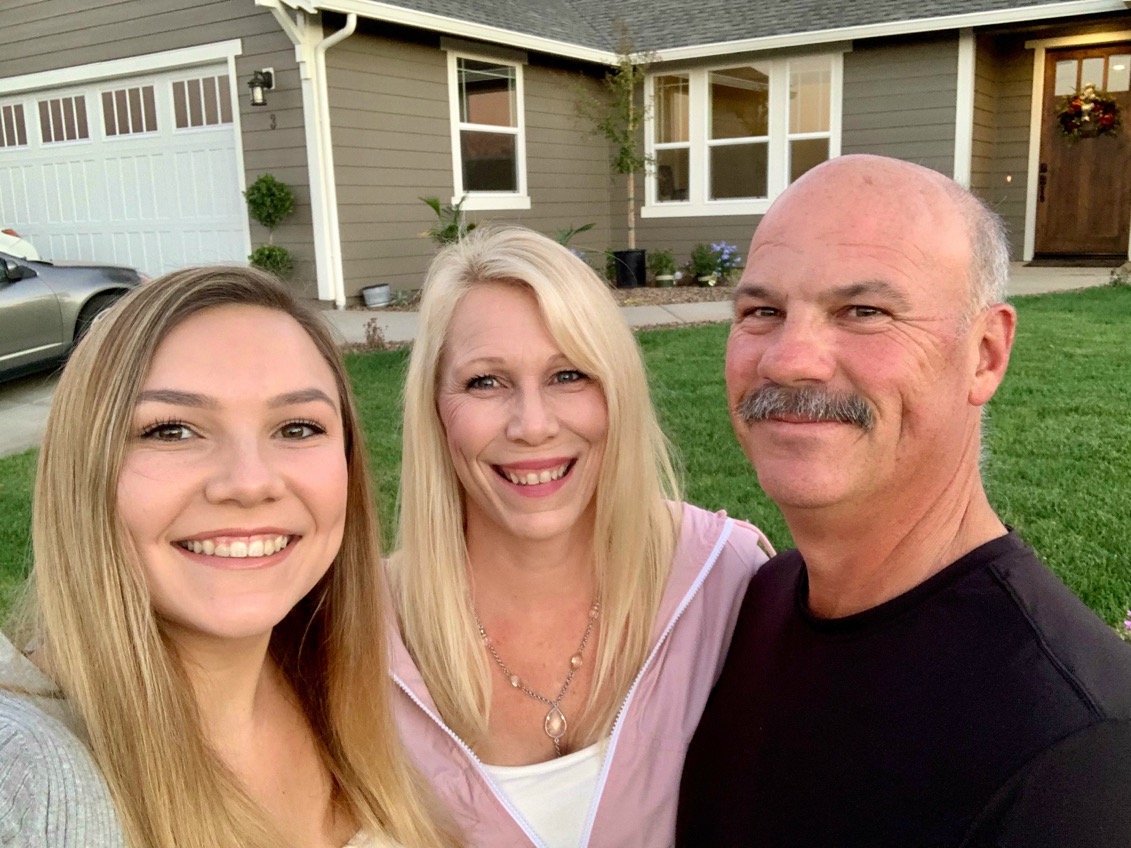
In the 12 months that followed November 8, 2018, it was hard to face all the firsts.
“First holidays, birthdays, anniversaries all in a new town and different house. We had to get new clothes, create new routines, change our traditions,” said Kelsea Kennedy. “Everything was different and felt hard in the first year.”
But moving forward and healing in the 12 months that followed, she is starting to feel that the new life she has is “pretty great.”
Kennedy graduated shortly after the fire and accepted a dream job with the University’s Office of Admissions, where she had worked as an undergraduate. She continues living in Chico and supporting her parents and extended family who all lost their homes. She’s done some traveling with her sister, Karissa, watched some of her best friends get married, and celebrated four babies that were born in her family. Because of the pandemic, she’s also spent a lot more time close to home, where she has found comfort baking, exploring Bidwell Park, and watching her parents’ new house be built in Chico.
“We just moved in last Friday!” she said in late October. “It’s hard to say there has been any normalcy because of COVID-19 but there are definitely times where I’ll be doing something like riding bikes in the park to the farmers market and it’s like, ‘Oh, this is my new life, this is what we do on a normal basis now.’ Life now is different, but different in the best way.”
Kennedy still feels like she lost her community, because so many people left and life transformed incredibly fast. But she’s come to accept that change is inevitable, regardless of wildfire, and she’s also discovered that she and most people she knows are stronger and more resilient than she ever realized.
“Two years ago, it felt as if life had stopped. Day by day was going by, but it didn’t feel like things were changing or getting better. Every conversation was about the fire or eventually turned to the fire—what it did to us and took from us. Our life was consumed by the fire, literally and figuratively,” she said. “I remember being sad and wondering if I was ever going to stop being sad, and then suddenly it’s been almost two years and life is really great. I look back at what has happened over the last two years and it’s been incredible. I’ve had some of the best days of my life.”
KELLY SHIELDS
Staff Member, University Farm
4-month Paradise Resident
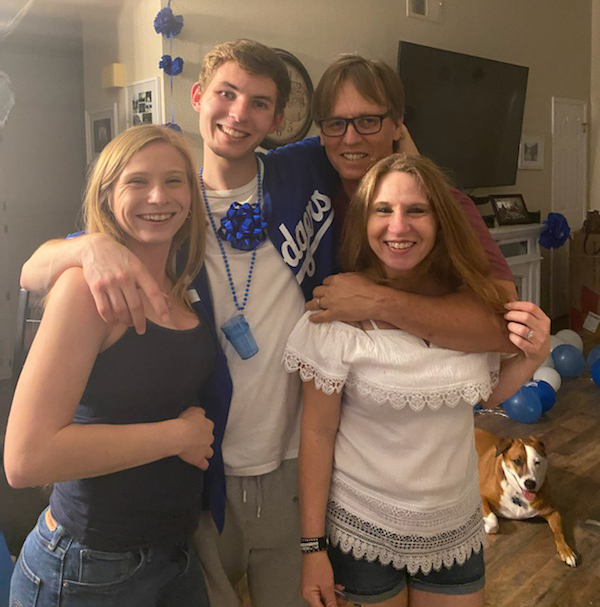
Kelly Shields was no stranger to fire, having lost most of his family’s belongings in an electrical fire in March 2018. When they lost their home in Paradise and the life they had been cobbling back together just seven months later, it felt like a bad dream.
He turned to the mantra he has lived by since his childhood: “Life is wonderful, even at its worst.” While things may have felt upside down for a while, Shields and his family pushed forward as they have always done.
“We never saw it as a recovery. More of a new start,” he said. “Dwelling on it or anything gone wrong just makes your world that much harder. What is done is in the past. Our whole family made it out—it’s the people that lost loved ones and pets that we feel for—next to them we have no business feeling sorry for ourselves. We were blessed next to them. Outside of family, everything else is just material. Sure, the sentimental things we miss, but it didn’t take away our memories and that’s all that counts.”
After initially planning to purchase a modular home and place it on their Paradise lot, Shields and his wife, Sandy, decided that the time, astronomical costs, and the headaches of rebuilding were not worth it.
“Life is too short, and too many good days would be lost dealing with them,” he said.
Instead, they closed escrow on a home in Chico in early October 2019. They’ve spent the last year remodeling it completely inside and out.
“That has kept us very busy and we are having a great time doing it,” he said. “It’s been very exciting actually starting over.”
He’s also been excited to watch both their children move on to college and exciting new careers. The happiness and pride he and Sandy have in them sustains them, along with appreciation for their own health and happiness.
He continues working at University Farm and enjoys spending time with his family above all else. Really, Shields said, he doesn’t think the fire had much to teach him, about himself or anything else.
“I have always known I love my family,” he said. “There is nothing more to learn there and that’s all that counts.”
SABRINA HANES
Former Student, Child Development
11-year Paradise Resident
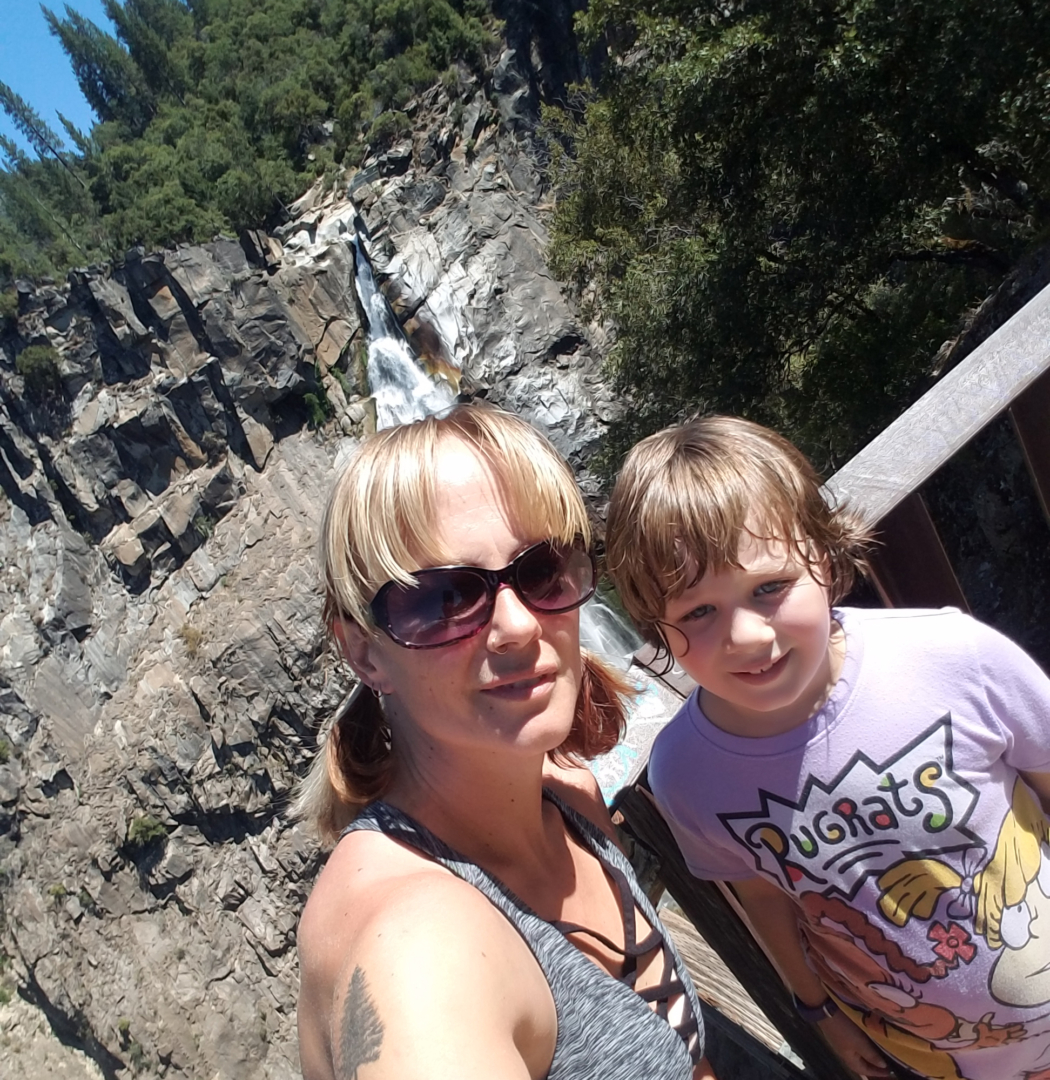
Sabrina Hanes didn’t imagine life could get much harder. But it did.
She lost both her grandparents three months apart from one another, and then two months ago her mother finally lost her eight-year battle with cancer. Due to the pandemic, they have not been able to hold any kind of memorial so it’s felt like closure is still ongoing. Adding to her struggle, she’s had difficulties with two junker cars that left her without transportation for two months, and she and her daughter, Aroara, are still living in the trailer she moved into after the fire, although they moved it from Los Molinos to outside Oroville.
“It still seems crazy that we are still in our trailer after two years but we are, and unfortunately, we are not the only ones in this situation,” she said. “I feel that I have learned how to fix the problems that arise with the trailer and try to accustom to this way of life as best we can. But the truth of it is, it’s hard. Life is just rough.”
The trauma of the fire came rushing back to her in August, when they had to evacuate from the Bear Fire and spent a night sleeping in the Home Depot parking lot.
“That night was so incredibly triggering, and I do not feel any sort of security from the fires yet,” she said.
Hanes is still taking a break from school as she struggles with the financial challenges and the emotional struggles that have plagued her and her young daughter since they fled their home. She still hopes to return to Chico State to complete her degree but is unsure how long it may take before that’s possible. In the meantime, she earned a certificate to teach two kinds of exercise programs and is excited to start teaching some of those classes.
“I do want to return to school but as to when that will happen, I am still not sure of. I think really until we work through the complications of PTSD, that I have to dedicate my time to healing,” Hanes said. “I think I am still searching for who I am, my wants in life, my purpose. The picture isn’t as clear, and I think when more healing is done, I will have a better sense of who I am and what I want.”
Meanwhile, she tries to stay positive and relishes in gratitude for the small things they do have and the people in their lives. Her big dream remains to find more permanent housing, with more space for Aroara, who turns 7 this month, to play and the amenities they were used to during their years in Paradise.
“I think the biggest thing for me is to find a sense of security again and to provide an actual home for Aroara, to have our own separate spaces where we can both shut doors and not just curtains,” she said with a laugh.
MANDY FEDER-SAWYER
Faculty, Journalism and Public Relations
25-year Paradise Resident
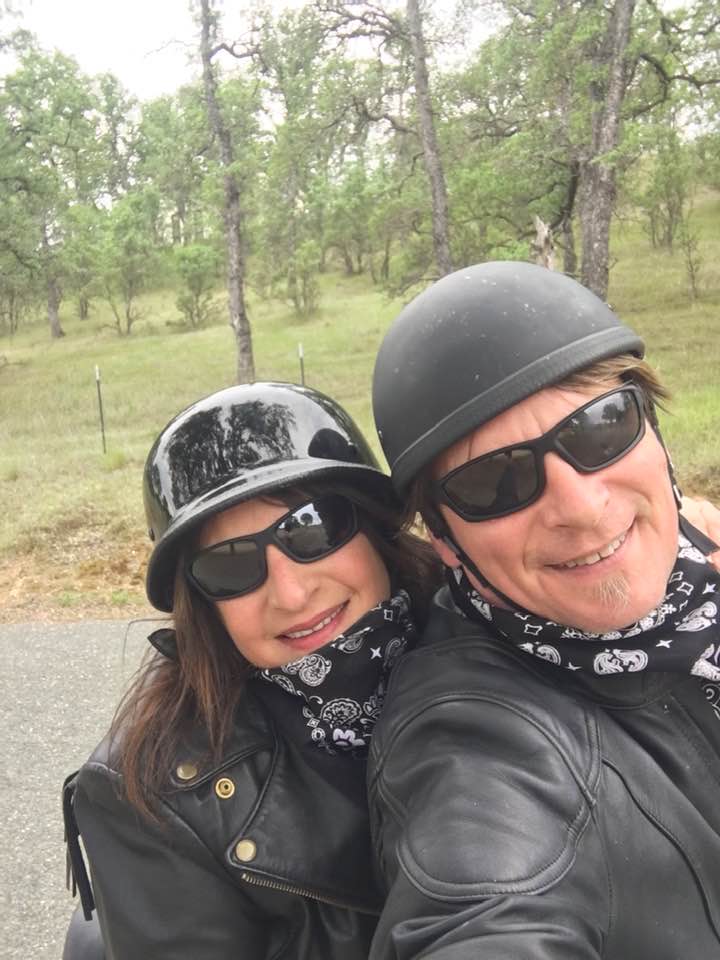
When Mandy Feder-Sawyer watched friends in Napa and Oregon lose their homes to wildfires this year, she was grateful to know what to do and say. It was a strange but good feeling to know she wouldn’t stumble or cause more harm in trying to provide support.
After all, she knew the experience all too well herself.
“I guess I never really knew how I would react to a catastrophe until the Camp Fire,” she said. “I’m grateful we didn’t panic, we got out, we supported one another and we all stuck together.”
Community has continued to be a strong theme for Feder-Sawyer in the last two years, as her family settled into the home they purchased in Red Bluff with the payout from their insurance company. She has befriended the neighbors and until the pandemic, they were making other friends and enjoying exploring the downtown area. She and her husband, Larry, are adjusting with socially distanced gatherings and relishing virtual connections when in-person connections are not possible.
“Larry performs virtual shows about once a week and we do virtual meet-ups with friends and family,” she said. “We take motorcycle rides when we’re able and we do lots of home-cooking. I think my attitude is about the same. We seem to roll with the tide and enjoy each other’s company.”
They still own their property in Paradise but are mulling on whether to keep it. She is frustrated by the rebuilding process, which appears to be muddled by conflicts of interest, and concerned by what she perceives to be unfair treatment of those who are trying to rebuild.
She tries not to dwell on what she lost, but every once in a while she delights in discovering remnants of her past. In September, her Facebook Memories reminded her of an image she had painted on her bedroom door in Paradise, which she planned to print and frame for her new house. And in October, a lifelong friend surprised her by finding some photos of her children that she thought had been lost forever in the fire.
Feder-Sawyer continues to carry a full teaching load and has finally been able to tap back into her creative side. While six months after the fire, she struggled to find the words to articulate its impact, she is now lending her talents to writing for newspapers, and earlier this year, a Camp Fire documentary aired on Frontline for which she had been an assistant producer. This weekend, she signed a deal to write a book related to the fire.
She cares deeply about chronicling recovery, even when it’s challenging.
“We pretty much take one day at a time,” she said. “I guess the biggest win was that the fire dreams subsided, at least until these current fires, which was a pretty big trigger for all of us.”


